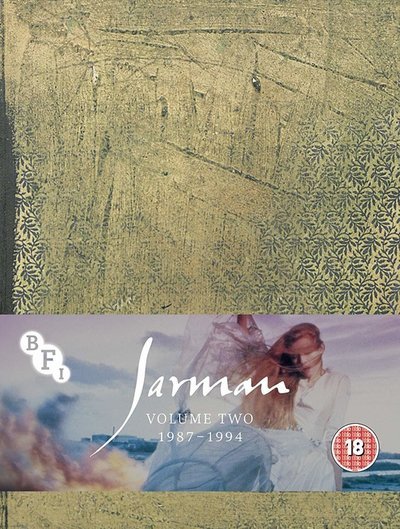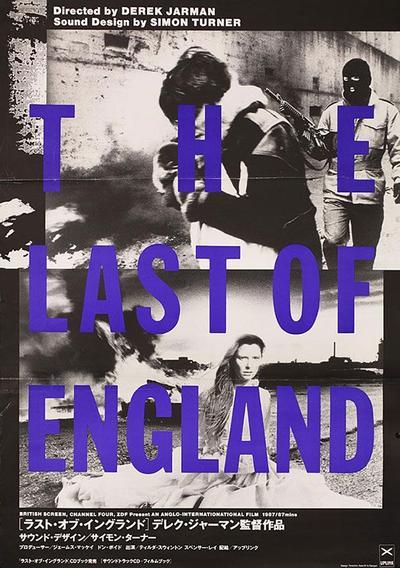Jarman quietly back in Kenneth Anger-mode with all the expected superimpositions and coloured gels in slow motion.
Set on the island of Mon off the coast of Denmark and Death Dance – Jarman’s rendition of a Dance Macabre.
A film in two parts: first in black-and-white we trek through a forest, down some steep wooden steps to the bottom of a cliff face; a photo of a star nebula is superimposed over the whole; secondly in colour is a series of still views of a green landscape peppered with small mounds.Read More »
Derek Jarman
-
Derek Jarman – Ashden’s Walk on Møn (1973)
1971-1980Derek JarmanExperimentalShort FilmUnited Kingdom -
Derek Jarman – War Requiem (1989)
1981-1990ArthouseDerek JarmanExperimentalUnited Kingdom
War Requiem is a 1989 film adaptation of Benjamin Britten’s musical piece of the same name.
It was shot in 1988 by the British film director Derek Jarman with the 1963 recording as the soundtrack, produced by Don Boyd and financed by the BBC. Decca Records required that the 1963 recording be heard on its own, with no overlaid soundtrack or other sound effects. The film featured Nathaniel Parker as Wilfred Owen, and Laurence Olivier in his last acting appearance in any medium before his death in July 1989. The film is structured as the reminiscences of Olivier’s character, the Old Soldier in a wheelchair, and Olivier recites “Strange Meeting” in the film’s prologue.Read More »
-
Derek Jarman – Glitterbug (1994)
1991-2000ArthouseDerek JarmanExperimentalQueer Cinema(s)United KingdomQuote:
Maverick British gay director Derek Jarman’s last film is a wordless compilation of his home movies from 1970 — six years before his debut feature “Sebastiane” — to 1986, set to a Brian Eno score. Footage ranges from casual snippets of home life to behind-the-scenes set footage, along with appearances from famous friends like William S. Burroughs and the Sex Pistols. As the years progress, the spread of AIDS begins to decimate Jarman’s social circle.Read More » -
Paul Humfress & Derek Jarman – Sebastiane (1976)
1971-1980ArthouseCultDerek JarmanPaul Humfress and Derek JarmanQueer Cinema(s)United Kingdom
Quote:
Filmed entirely in vulgar Latin, this experimental film recounts the life of Sebastiane, a puritanical but beautiful Christian soldier in the Roman Imperial troops who is martyred when he refuses the homosexual advances of his pagan captain. When this film was released, it was the only English-made film to have required English subtitles, and it is an early film by the noted experimental and outspokenly homosexual director Derek Jarman, who died in 1994.Read More » -
Derek Jarman – A Journey to Avebury (1971)
1951-1960Derek JarmanExperimentalQueer Cinema(s)Short FilmUnited KingdomJourney to Avebury beautifully reflects Derek Jarman’s fascination with ancient history, paganism, and Celtic traditions.
An IMDB review:
Derek Jarman is often said to be a painter rather than a movie director. Indeed, with his films he makes pictures that seem to be more important than the plot (which is usually unclear or missing at all). But those pieces of art he creates using camera are beautiful and astounding.Read More » -
Various – The Dream Machine (1980 – 1983)
ArthouseDerek JarmanExperimentalQueer Cinema(s)United KingdomVariousreview of Dream Machine from link
Burroughs’ Dream Machine On Film… Nearly., 26 March 2004
6/10
Author: scottanthony from Dorset, EnglandIn theory: a short non-narrative film made to commemorate the visit of Burroughs and Gysin to the UK. In practice: four shorts (directed by Jarman, Kostiff, Maybury and Wyn Evans) broken up by footage of Gysin gazing at said machine.Read More »
-
Derek Jarman – Jubilee (1978)
1971-1980CultDerek JarmanDramaQueer Cinema(s)United KingdomQuote:
Punks hail Britannia in their own peculiar way in this little-seen gem by the late queer auteurJubilee (1978), Britain’s only decent punk film, still isn’t respected at home as much as it should be, and it remains pretty obscure everywhere else. Instead, we had to wait for Trainspotting (1996) to represent some sort of renaissance in “cool” British cinema. Yet, even though it is almost 20 years older, Jubilee makes Trainspotting’s self-congratulatory, CD tie-in antics look like a polite Edinburgh garden party.Read More »
-
Derek Jarman – The Last of England (1987)
1981-1990ArthouseDerek JarmanQueer Cinema(s)United KingdomQuote:
Jarman is a tough filmmaker to recommend, but he occasionally rewards. As we’ve seen from practically the first film on, he sets out to make pictures entirely for himself; with each one intellectually structured, creatively shot, but almost always a reflection of his personal thoughts and feelings, his sexuality, and England in decline. Here we have a film that combines all of these preoccupations, told in a combination of wordless images and narrated prose, with little or no clarification given as to what is actually going on. Jarman has said that he wanted the film to feel like a visual poem, but really, this is far from poetic. Instead, this seems more like something that Godard would have directed in the 1970’s; angry, venomous and always seething with contempt. The images here are violent to the extreme and the approach that Jarman brings to the editing room is visceral and heavily kinetic. Here we see the use of various colour filters, tints and distortions used alongside a multitude of film stocks and spliced-in video footage. The images of middle-class households rounded up, driven into the depths of a post-apocalyptic wasteland and detained at gunpoint must have had a shocking relevance at the time, when terrorist attacks and IRA bombings were as common as they were incomprehensible.Read More » -
Derek Jarman – The Tempest (1979)
1971-1980ArthouseDerek JarmanQueer Cinema(s)United KingdomQuote:
Prospero, a potent necromancer, lives on a desolate isle with his virginal daughter, Miranda. He’s in exile, banished from his duchy by his usurping brother and the King of Naples. Providence brings these enemies near; aided by his vassal the spirit Ariel, Prospero conjures a tempest to wreck the Italian ship. The king’s son, thinking all others lost, becomes Prospero’s prisoner, falling in love with Miranda and she with him. Prospero’s brother and the king wander the island, as do a drunken cook and sailor, who conspire with Caliban, Prospero’s beastly slave, to murder Prospero. Prospero wants reason to triumph, Ariel wants his freedom, Miranda a husband; the sailors want to dance.Read More »







